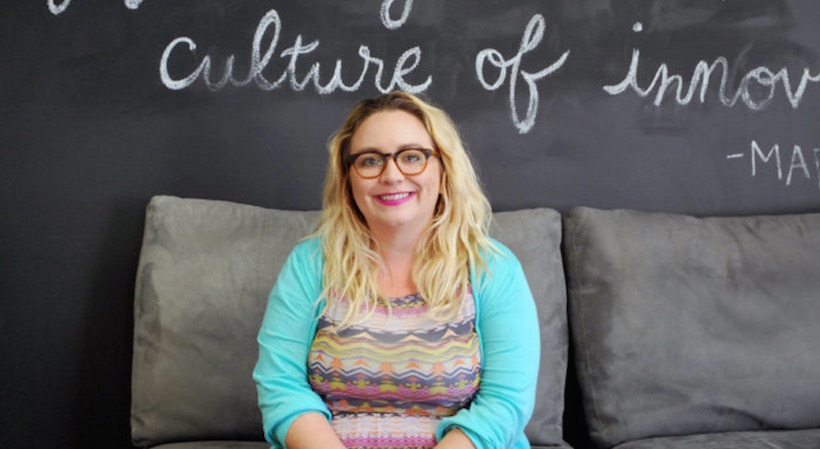Charlie Heck is the founder of Checkmark Creative, a marketing boutique that works with small businesses to tell their stories through social media, website design and infographics. “We take really complex material and make pretty little Facebook and Instagram posts out of it,” explained Heck. After a job loss, Heck found a non-traditional way to save money to start her business and fund a cross-country move: with a side hustle.
Get Free Quote: Money for your business without the hassle with Rapid Finance
Starting out
Why did you start your business?
I was raised in a small business (a diesel repair shop in El Paso, Texas), so I learned the value of direct word-of-mouth marketing and a need to communicate your brand to people. I watched my mom look for creative ways to market the repair shop.
I went to journalism school and graduated into the recession. When people were getting laid off at newspapers and magazines, I got an internship doing PR and marketing. I made it to D.C. and did a bunch of PR for a furniture manufacturer and ended up doing PR for the federal government. I worked in science and got to make really awesome podcasts and web series. Then, we all got fired.
When an administration changes, they tend to bring in their own people. I was living in one of the most expensive cities without a job. Government work wasn’t something that I wanted to continue, so I started pet-sitting and dog-walking. I was able to have an app-driven job, which allowed me to work whatever hours I wanted.
While I was doing that, I started freelancing and taking really low-paying gigs as a multimedia person in D.C. I reached out to videographers and interns from other projects and started building this creative agency. I eventually got enough clients that I was able to move out to Long Beach, California, and work for myself.
Related: How This Entrepreneur Produced Passive Income With Her Business
How did you fund the business at the start?
I knew that in order for me to be able to move across the country, I had to pay down my credit card debt. That was the thing I focused on first because I knew that if I was going to go into this world without a salary, I had to pay down my monthly bills.
There were months when I was stretched so thin, learning and developing the business. But, I still walked dogs sometimes 7 miles a day because I knew I had to get a little nest egg for California and take care of some irresponsible spending from earlier in my life.
Running the business
How do you manage cash flow?
I am a writer and creative, so math and budgets and all of that is what I don’t love about owning a business. I use QuickBooks and I have a dear friend who is an accountant to answer my questions as they come up.
What’s the most challenging thing about running the company?
I love doing the creative stuff, and planning, and looking at the big picture. But, things like examining project growth and determining what is and isn’t working is one of the hardest things I do, because I have to make time for it.
I have to do this and that and make all kinds of deadlines, but I also have to carve out two hours a week to make sure I put in all my bills right and track my receipts and do all the little things like that. If you don’t take the time at least once a week, it’s one of the most stressful parts of running a business.
What’s the most rewarding thing about running the company?
I’ve started a little internship program that is paid. It’s been really great to mentor some new people who are coming up. I also like that I can take a phone call when I want to or have a lunch when I want to catch up with someone who is in town for a day. The flexibility to do what I love and to handle daily stressors is one of my favorite things.
What I’ve learned
What’s the biggest mistake you made when starting out?
Most entrepreneurs will tell you that they should have said “no” to a few things. There’s nothing wrong with building your portfolio or taking accounts that don’t pay as high as you would bill hourly. But, there are some people who drain your time and energy without fully committing to a project.
Now that I’ve been doing it for so long, I’m better able to spot “problem companies.” But, I’ve spent far too much time and energy trying to cultivate a person or an account that just was never going to advance my skills in any way. It’s OK to say “no” sometimes.
What’s the smartest thing you did when starting out?
I saw my parents struggle and get behind on so many things. I went to free business classes and workshops when I started out. In some of them, I learned absolutely nothing, but I might have met a person who was going through the same things or had the same questions.
I don’t think my parents ever really had mentors or someone to ask questions. They kind of just figured it out on their own, which isn’t bad. But, I know it caused them a lot of stress in the long run.
What advice would you give to a new entrepreneur?
Some people want to start their own small business because they don’t want to work as much. I work every single day. I don’t hate what I do, so it doesn’t feel like work to me. If you think you’re going to have more free time by starting a business, you’re probably misguided in that.
Sign Up: Receive the StartupNation newsletter!
Future plans
What’s next for Checkmark Creative?
Small business changes. Especially with digital marketing and creative services, you need to adapt, too, because every year there’s a new platform. As I was slowly evaluating my business recently, I had a client suggest that I specialize in legal creative services, because I have so many clients in that area. I realized that there’s nothing wrong with having a niche, so that’s what I’m doing now.
This article originally appeared on Nav.com by Ashley Sweren
Feature image courtesy of Charlie Heck






